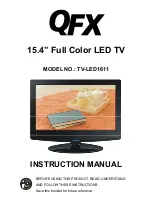
Safety Precautions
General Guide Lines
1. When servicing, observe the original lead dress. If a short circuit is found, replace all parts which have been overheated
or damaged by the short circuit.
2. After servicing, see to it that all the protective devices such as insulation barriers, insulation papers shields are properly
installed.
3. After servicing, make the following touch current checks to prevent the customer from being exposed to shock hazards.
4. Always ensure panel TKKL5290 is correctly replaced before returning to customer (see Fig.1).
Touch-Current Check
1. Plug the AC cord directly into the AC outlet. Do not use an isolation transformer for this check.
2. Connect a measuring network for touch currents between each exposed metallic part on the set and a good earth
ground such as a water pipe, as shown in Fig. 2.
3. Use Leakage Current Tester (Simpson 228 or equivalent) to measure the potential across the measuring network.
4. Check each exposed metallic part, and measure the voltage at each point.
5. Reserve the AC plug in the AC outlet and repeat each of the above measure.
6. The potential at any point (TOUCH CURRENT) expressed as voltage U1 and U2, does not exceed the following values:
For a. c.: U1 = 35 V (peak) and U2 = 0.35 V (peak);
For d. c.: U1 = 1.0 V,
Note:
The limit value of U2 = 0.35 V (peak) for a. c. and U1 = 1.0 V for d. c. correspond to the values 0.7 mA (peak) a. c. and
2.0 mA d. c.
The limit value U1 = 35 V (peak) for a. c. correspond to the value 70 mA (peak) a. c. for frequencies greater than 100
kHz.
7. In case a measurement is out of the limits specified, there is a possibility of a shock hazard, and the equipment should
be repaired and rechecked before it is returned to the customer.
Fig. 2
Fig. 1
4
TO
APPLIANCES
EXPOSED
METAL PARTS
Resistance values in ohms (
Ω
)
V
R
0
=500
Ω
R
S
=1500
Ω
C
S
=0.22
µ
F
10k
Ω
0.022
µ
F
U
1
COLD
WATER PIPE
(EARTH GROUND)
V: Voltmetr or oscilloscope
(r.m.s. or peak reading)
Measuring network for TOUCH CURRENTS
Input resistance:
≥
1M
Ω
Input capacitance:
≤
200pF
Frequency range: 15Hz to 1MHz and d.c.respectively
NOTE – Appropriate measures should be taken to obtain the correct value in case of non-sinusoidal waveforms
U
2
(V)
Summary of Contents for Viera TX-26LXD600
Page 54: ...AP BOARD TX 32LXD600 TX 26LXD600 54 ...
Page 55: ...AP BOARD TX 32LXD600 TX 26LXD600 55 ...
Page 56: ...AP BOARD TX 32LXD600 TX 26LXD600 ...
Page 57: ...DG BOARD TX 32LXD600 TX 26LXD600 ...
Page 58: ...DG BOARD TX 32LXD600 TX 26LXD600 ...
Page 59: ...DG BOARD TX 32LXD600 TX 26LXD600 ...
Page 60: ...DG BOARD TX 32LXD600 TX 26LXD600 ...
Page 61: ...DG BOARD TX 32LXD600 TX 26LXD600 ...
Page 62: ...DG BOARD TX 32LXD600 TX 26LXD600 ...
Page 63: ...DG BOARD TX 32LXD600 TX 26LXD600 ...
Page 64: ...DG BOARD TX 32LXD600 TX 26LXD600 64 ...
Page 65: ...DG BOARD TX 32LXD600 TX 26LXD600 ...
Page 66: ...TX 32LXD600 TX 26LXD600 G BOARD ...
Page 67: ...GS BOARD TX 32LXD600 TX 26LXD600 ...
Page 68: ...H BOARD TX 32LXD600 TX 26LXD600 68 ...
Page 69: ...H BOARD TX 32LXD600 TX 26LXD600 69 ...
Page 70: ...H BOARD TX 32LXD600 TX 26LXD600 70 ...
Page 71: ...H BOARD TX 32LXD600 TX 26LXD600 71 ...
Page 72: ...K and V BOARD TX 32LXD600 TX 26LXD600 72 ...
Page 73: ...TX 32LXD600 TX 26LXD600 ...
Page 74: ...XV BOARD TX 32LXD600 TX 26LXD600 74 ...
Page 75: ...XV BOARD TX 32LXD600 TX 26LXD600 ...
Page 76: ...XV BOARD TX 32LXD600 TX 26LXD600 ...





































